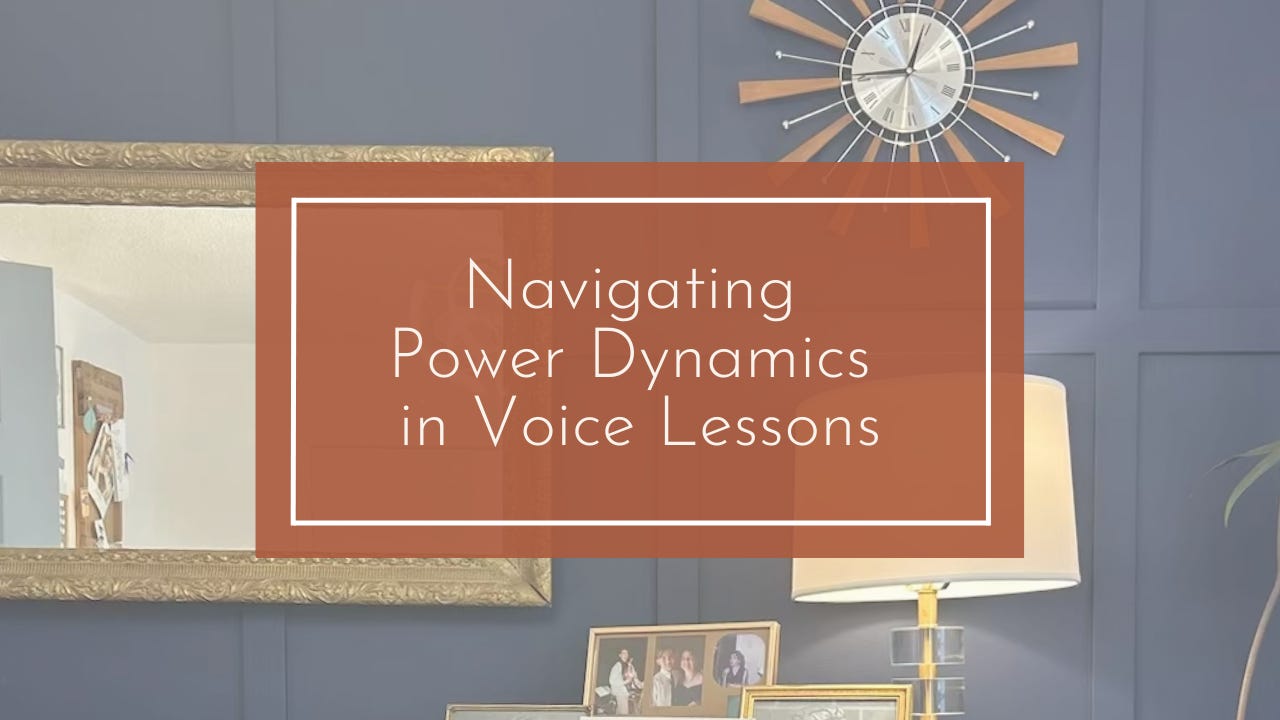Ever been working your butt off to do that whole student-led thing only to find yourself wondering why it feels like you no longer have any say in your own danged studio? Like, maybe you’re in a student-hijack kind of situation? Yeah; me too.
The Power Dynamic: It's Real
First off, let’s just get real clear that the power dynamic is real. I tend to equate a ‘student-led’ teaching dynamic with what Brene Brown calls a “power-with” (vs “power-over”) relationship. And sometimes when we’re being really intentional about changing the “power-over” in our teaching, the balance tips a little too far and suddenly we’re trying to figure out how to maybe get a little more “power-over” back … (#amiright?)
Why Does it Even Happen, Though?
To my mind, one (or more) of several factors can be at play when we’re feeling a little hijacked in a lesson situation:
Age and Experience: Older students or those with extensive singing backgrounds might struggle to respect younger or less experienced teachers.
Gender Perception and Physique: Female or femme-presenting teachers - particularly those who are petite and/or have higher voices - might be perceived as less authoritative because of social conditioning that tells us to equate physical presence with authority. (All the 5’2 sopranos just giving me a LOOK rn.)
Teaching Environment: Working from a home studio can sometimes be unfairly judged as less professional (ask me how I know), affecting how students and/or their parents perceive our expertise.
Cultural and Social Conditioning: Those of us socialized as female may feel uncomfortable taking up space or asserting our authority, and diminish our presence and knowledge with charm or self-deprecation, leading students to not fully buy into our expertise because we aren’t -ahem- serious enough. (Again: ask me how I know.)
So how do we deal with it? (You know, without reverting back to a full-on “power-over” relationship.)
Recognize the Signs
First of all, we recognize the signs that we’ve been hijacked. And not just in a, “this feels off but it’s fine” kind of way. Here are three objective(ish) signs that we may be experiencing a student-hijacked situation:
1. Vague (or Concealed) Goals
When a student has goals but somehow never shares them with you. Like, they tell you they’re taking lessons because they want to “sing better” and it seems like they know what they want to do to “sing better” … but they’re verrrrrry vague about -gestures widely- the whole thing and they seem super disinclined to get specific with you.
And, by not sharing their goals, you get the distinct impression that they don’t believe you can actually help them reach their goals.
They may say things like, “well, you wouldn’t know …”, or “but you’ve never had to deal with …”.
2. Feedback Dismissal
When a student constantly counters your feedback or directives with their own opinions in a “you don’t know what you’re talking about” kind of way … even when you’re literally using their own words in your feedback or directive. Like, they tell you that something is too high for them … so you ask them what range would feel more comfortable … and they respond with: no; it’s fine there.
And every time they do that, you get the distinct impression that they are (not-so) subtly letting you know they don’t think you’re up to par.
They may say things like, “yes, but …”, or “that’s not what’s happening …”.
3. Experience Boasting
When a student frequently name drops other teachers or quotes YouTube -ahem- experts or reminds you of their vast experience in a “I’m doing you a favour by even being in your studio” kind of way. Like, they don’t seem to be seeking clarity or bringing up these things in good faith.
And every time they bring up another teacher or TikTok coach or well-known company they sang in, you get the distinct impression that they think you’re not exactly measuring up.
They may say things like, “so-and-so says …”, or “when I was working with xyz …”.
3 Steps to Get Back to Student-Led
1. Recognize The Reaction
When we are experiencing student-hijack, it can be really easy to react in a self-protective way (because: it doesn’t feel great to be hijacked). So the first step to getting back on the student-led track is to recognize when we’re gettin’ all up in our feels about it.
Here are some common reaction types (I’m sure you’ll recognize them):
FREEZE - If you’re a ‘freezer’, you might:
Second-guess everything you say or hear
Feel like the lesson is an ocean of molasses through which you are desperately attempting to swim
FAWN - If you’re a ‘fawner’, you might:
Turn on the charm offensive to win their favour
Take up less space in order to accommodate them
FIGHT - If you’re a ‘fighter’, you might:
Over-explain in order to prove your expertise
Dismiss (or downplay) colleagues (or other experts), or the student’s experience
2. Observe the Reaction
Once we are able to recognize that we’re reacting to a situation, we can often neutralize the potency of that reaction by observing it ‘in third person’.
When we observe the reaction ‘in third person’ (rather than experience it ‘in first person’), we can use the data gained from the observation to prompt us to be able to react in a different way.
Observing the reaction can look something like saying:
“Huh; This is a thing that is happening right now.”* Or,
“I am going into flight/fight/fawn mode. Interesting.”
3. Get Curious
When we’ve intentionally moved into ‘third person mode’ by observing our reaction, we have a far better chance of having the wherewithal to stop reacting and start getting curious.
Get Curious About:
1. Vague (or Concealed) Goals
When goals are vague or concealed, it’s useful to go beyond the more general, “After working together for three months, what do you hope you’ll be able to do that you can’t do now?” to: “What brought you to me specifically? What exactly can I help you achieve?”.
When we clock that a student may be being vague about their goals because they believe we can’t help them reach those goals, and we get curious about that (rather than (or maybe WHILE) getting triggered by it), we might just get the info we need to unlock their trust in our ability to support them.
2. Feedback Dismissal
Experiencing constant feedback dismissal? Try asking, “What feels like the right next step for you?”, or “What is your first instinct to work on …?”.
When we clock that a student is not buying in to our feedback or suggestions because they question our expertise, and we get curious about that (rather than (or maybe WHILE) getting triggered by it), we might just guide the singer to begin to trust the process, and thereby trust us to be with them in the process.
3. Experience Boasting
Getting tired of hearing the words of other teachers or coaches or choral directors second-hand? Try asking, “What made that choir experience so memorable for you? How can we incorporate some of those elements into our sessions?”, or “What was the best directive that teacher gave you? Why was it so useful for you? How do you use it in your singing today? How would you like to apply it in our sessions?”, or “What’s the most interesting thing that TikTokPeep says about singing? How did it impact your singing? What of that seems similar to what we’ve been working on in our sessions?”.
When we clock that a student thinks every other teacher or previous experience of theirs is more valid than what they’re doing with us, and we get curious about that (rather than (or maybe WHILE) getting triggered by it), we might just validate their experiences enough for them to stay in the moment with us. And? We will likely learn some terrific concepts or directives or ways of supporting singers, as well.
In the end …
Navigating that student-led dynamic can be … tricky.
So the next time you feel a hijack situation developing, take a deep breath, observe that “this is a thing that is happening”, get curious, and gently steer the ship back on course.
Happy teaching, voicepedpals - let me know how it goes!
XO, Shannon
PS This post is based on my 19th July, 2024 Live Office Hours called, “A Particular Kind of Power Balance”; if you’d rather watch than read? Click here.
PPS Registration for my Evolving Voice Lecture Series is open until 14 Aug 2024 at 10am (et).
PPPS Missed the Evolving Voice Lecture Series but want to catch alll the replays? Consider subscribing to The VoicePed 101 Library.
PPPPS Wanna explore some of these concepts up close and personal in a one on one sesh? Cool beans. Get in touch and I’ll send you the deets.
*#shoutout to Michelle Markwart Deveaux for that particular gem.



